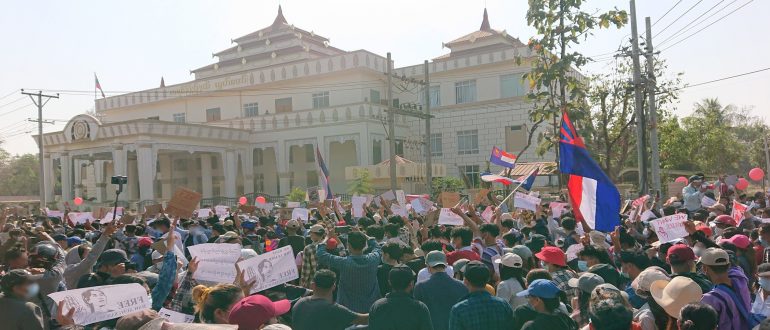
Myanmar’s (In)direct Military Rule
On the 1st of February 2021, Myanmar woke up to a military coup. The army’s ultimate authority, commander-in-chief Min Aung Hlaing, took over the parliament while soldiers took on the streets of the capital, Nay Pyi Taw, and the main city, Yangon, and most of the country’s civilian leaders were being detained.
The military, also known as the Tatmadaw, insisted that ‘the voter lists which were used during the multi-party general election held on the 8th of November were found to have huge discrepancies and the Union Election Commission (UEC) failed to settle this matter’ (MWD 2021). It is worth noting that the National League for Democracy (NLD), headed by Aung San Suu Kyi, won the elections with an 83 percent of available seats and the military did not expect such a disparity in the results (Reuters 2021). Despite the UEC declaring that there was no evidence to support such claims, the military still disputed the results and filed complaints at the Supreme Court against the president and the chair of the commission.
Myanmar’s political history shows that, since the 1962 coup, the military has been the most powerful political actor in Myanmar (Stokke 2018), directly ruling from 1962 to 2011 and indirectly from 2011 (Prager 2011) until now. This is one of the reasons why the Tatmadaw considers itself the father of the nation, thereby carrying an inherent sense of ‘obligation and entitlement’ to rule the country.
While the army recognizes that sovereignty must derive from its people, they consider themselves entitled to ‘solve the fraudulent elections according to the law’ since such acts contradict the democratic process. In this line, Article 418(a) of the 2018 Constitution has been used as the legal basis for the army to assume the authority of the nation’s legislative, executive and judicial powers. Accordingly, Article 417 reads that any ‘acts or attempts to take over the sovereignty of the Union by wrongful forcible means’ would lead to the declaration of the state of emergency in the territory of Myanmar, in whole or in part, for the period of one year since its promulgation.
Notwithstanding the current coup, with the 2008 Constitution and its amendments giving a quarter of the seats in parliament to the military (Myanmar 2008) and allowing the Tatmadaw to keep the ability to impose its will as soon as its authority over defence was affected by new reforms and thus ensuring the generals’ domination (Albert 2017) of Burmese politics and unchallenged control of the State (Barany 2018), the military already indirectly influenced and exerted its authority during pre-coup ruling.
As a direct consequence of the coup, military’s nationalist discourse (Foxeus 2019) would imply isolation of non-Chinese international partners, who have called on the military to respect the rule of law, resolve disputes through lawful mechanisms and immediately release all civilian leaders and others who have been detained unlawfully thereby restoring the democratic process. In addition, it would also lead to a serious damage of its commercial interests, since the army did not align with Myanmar previous openness to international trade, and view outsiders especially as a danger.
However, not only will the Tatmadaw face challenges internationally. The coup could induce an escalating resentment and resistance from millions of people who voted for the NLD, thus intensifying the existing tension and potentially leading to a stage of bloody riots if the rhetoric of the once again home-arrested Aung San Suu Kyi, of not accepting the coup and protesting against it, is followed by its supporters.
It bears highlighting that it is not the first time there have been allegations concerning electoral fraud in Myanmar. Controversial were also the questionable constitutional referendum in May 2008, without the presence of foreign observers (HRW 2008) and during a period of desolation caused by the largest natural disaster ever to have taken place in Myanmar (HRW 2008), and the November 2010 elections, denounced to be unfair (OHCHR 2011) and fraudulent (Holliday 2010).
Once again, the military argues that these events could ‘lead to a disintegration of national solidarity’, but Myanmar has spoken, and its people want a democratic path. Having unity as a national priority will also give the Tatmadaw the impunity, which it already enjoyed to some extent when the civilian government provided them with cover-up at all stages, to continue and increase the violence and repression exerted towards ethnic and religious minorities, especially the Rohingya community.
It is surprising how the military refers to national security when there is an internal armed conflict between the Tatmadaw and the Rohingya ethnic minority. But most surprising is their seeming preoccupation about an obstruction to ‘the path to democracy’, because what would not hinder it would be a military coup, obviously. They are ‘solving’ this issue in the same way they have denounced the election, by taking the sovereignty of the Union by wrongful forcible means.
Subjecting Myanmar back under a military dictatorship has not only dropped, but also reversed any effort of democratization.
Disclaimer: The views and opinions expressed in this article are those of the author and do not necessarily reflect the opinion of IFAIR e.V. or its members.
References
Myawaddy Television (MWD), Statement from Myanmar military on state of emergency, 1 February 2021. Accessed 1 February 2021.
Reuters (2021), Explainer: Crisis in Myanmar after army alleges election fraud, 1 February 2021. Accessed 1 February 2021.
Constitution of the Republic of the Union of Myanmar, 29 May 2008, Section 436, p.111. Accessed: 3 February 2021.
Prager Nyein, S. (2011), The Armed Forces of Burma: The Constant Sentinel, in Marcus Mietzner (ed.), The Political Resurgence of the Military in Southeast Asia, Conflict and Leadership, London/New York, Routledge, pp. 24-44.
Stokke, K.; Vakilchuk, R.; Overland, I.(2018), Myanmar: A Political Economy Analysis, Norwegian Institute of International Affairs, pp. 8-35. Accessed: 3 February 2021.
Holliday, I. (2014). Addressing Myanmar’s citizenship crisis, Journal of Contemporary Asia, Vol. 44 No. 3, pp. 404-421. Accessed: 2 February 2021.
OHCHR (2011). Situation of human rights in Myanmar, A/66/267, 5 August 2011, p.10. Accessed: 2 February 2021.
Human Rights Watch (2008). Vote to Nowhere: The May 2008 Constitutional Referendum in Burma, 30 April 2008. Accessed: 1 February 2021.
Human Rights Watch (2008). ‘Burma: Reject Constitutional Referendum, Government’s Poor Cyclone Response Shows Need for Democratic Reform’, 17 May 2008. Accessed: 1 February 2021.
Foxeus, N. (2019). The Buddha was a devoted nationalist: Buddhist nationalism, ressentiment, and defending Buddhism in Myanmar, Religion, Vol. 49 No. 4, pp.661-690. Accessed: 1 February 2021.
Barany, Z. (2018). Elections and Constitutional Constraints: How the Generals Have Stayed in Power in Myanmar, SAIS Review of International Affairs, Vol. 38 No. 1, pp.105-117. Accessed: 3 February 2021.
E. Albert (2017). How Myanmar’s Military Wields Power From the Shadows, Council on Foreign Relations. Accessed: 1 February 2021.

Sara Lopez
Sara Lopez holds a Master's degree in Public International Law from the University of Amsterdam and researches in several fields of international law such as humanitarian, criminal and human rights law. She is currently focusing on the situation of the Rohingya community in Bangladesh.
